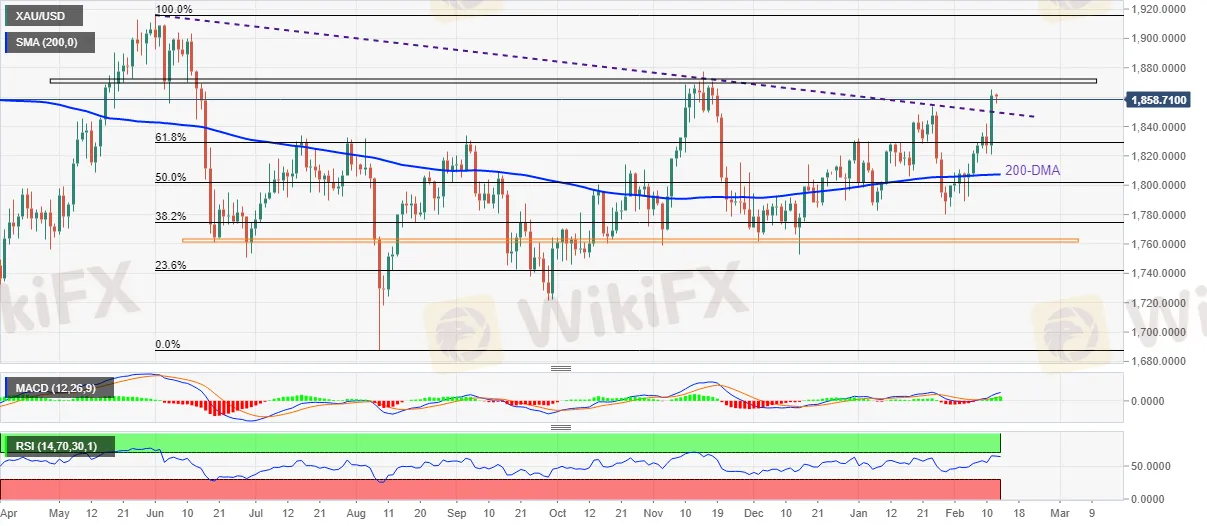简体中文
繁體中文
English
Pусский
日本語
ภาษาไทย
Tiếng Việt
Bahasa Indonesia
Español
हिन्दी
Filippiiniläinen
Français
Deutsch
Português
Türkçe
한국어
العربية
Gold Price Forecast: XAU/USD grinds below $1,873 hurdle on inflation, geopolitical fears
Abstract:Gold (XAU/USD) prices seesaw around the three-month high flashed the previous day, taking rounds to $1,860 during Mondays quiet Asian session.

Gold consolidates the biggest daily jump in four months.
Fridays risk-off mood dragged yields and fuelled USD, gold prices amid escalating concerns over Russia-Ukraine war.
Easing chatters over Feds 50bp rate-hike in March also weighed on bond coupons and will be watched in FOMC Minutes.
Gold Weekly Forecast: Is gold finally regaining its inflation-hedge status?
The yellow metal rallied the most since October 2021 on Friday after receding probabilities over Fed‘s 0.50% rate-hike, backed by softer US data, joined widespread fears of Russia’s immediate invasion of Ukraine.
The CME FedWatch Tool suggests around 50-50 chances of 50 basis points (bps) of a Fed-rate-hike in March versus a 0.25% move. Previously, especially after the US Consumer Price Index (CPI) release, the market was almost certain of a higher boost to the rates. That said, the preliminary readings of the US Michigan Consumer Sentiment for February eased from 67.2 to 61.7 on Friday.
Elsewhere, the US warned over Moscow‘s preparations for immediate war with Ukraine and urged all of its citizens to leave Kyiv. The UK and Eurozone policymakers also cited Russian preparations for an immediate war. However, the AFP News recently quoted Russian Leader Vladimir Putin saying to his French counterpart Emanuel Macron that Ukraine invasion claims are 'provocative speculation’.
Amid these plays, the US 10-year Treasury yields dropped over 11.0 basis points (bps) while Wall Street benchmarks also witnessed heavy losses due to the risk-aversion wave. The sour sentiment could also be witnessed by S&P 500 Futures that drop 0.15% intraday at the latest.
Looking forward, gold traders may await more clues from the Russia-Ukraine story and Fed‘s rate-hike concerns for near-term direction. As a result, this week’s FOMC Minutes will be a crucial event to watch while also keeping eyes on geopolitics for fresh impulse.
Read: New Geopolitical Threats for 2022: Is Gold in Danger Too?
Technical analysis
On Friday, gold prices portrayed the biggest daily jump in four months as buyers cheered escalating geopolitical tensions surrounding Russia, as well as inflation woes.
The run-up not only registered a fresh high of 2022 but also crossed a downward sloping trend line from June. Given the upbeat RSI and MACD conditions supporting the gold buyers, the latest upside has legs to run ahead.
However, a horizontal area comprising multiple levels marked since May, near $1,873, will be a crucial upside barrier for the metal to cross ahead of targeting the $1,900 threshold.
Should gold buyers keep reins past $1,900, the mid-2021 high surrounding $1,917 will be in focus.
Alternatively, an upward sloping trend line from February 03 close to $1,821 and the 200-DMA level of $1,807 restricts short-term declines of gold.
In a case where gold prices drop below $1,807, the $1,800 round figure and $1,760 will be on the sellers radar.

Disclaimer:
The views in this article only represent the author's personal views, and do not constitute investment advice on this platform. This platform does not guarantee the accuracy, completeness and timeliness of the information in the article, and will not be liable for any loss caused by the use of or reliance on the information in the article.
Read more

Will the Euro and US Dollar Reach Parity in 2025?
Euro-dollar parity sparks debate again as 2025 approaches, with multiple factors shaping the exchange rate outlook.

US Dollar Surge Dominates Forex Market
The global forex market continues to show volatility, with the U.S. dollar fluctuating last week but overall maintaining a strong upward trend. How long can this momentum last?

Oil Prices Soar for 5 Days: How Long Will It Last?
Last week, the global oil market saw a strong performance, with Brent crude and WTI crude prices rising by 2.4% and around 5% respectively. Oil prices have now posted five consecutive days of gains. But how long can this rally last?

How Big is the Impact of the USD-JPY Rate Gap on the Yen?
The U.S. Federal Reserve's repeated rate cuts and the narrowing of the U.S.-Japan interest rate differential are now in sight. So, why is the U.S.-Japan interest rate differential so important for the yen’s safe-haven appeal, especially when global economic uncertainty rises?
WikiFX Broker
Latest News
High-Potential Investments: Top 10 Stocks to Watch in 2025
US Dollar Insights: Key FX Trends You Need to Know
Why Is Nvidia Making Headlines Everywhere Today?
Discover How Your Trading Personality Shapes Success
FINRA Charges UBS $1.1 Million for a Decade of False Trade Confirmations
Bitcoin in 2025: The Opportunities and Challenges Ahead
BI Apprehends Japanese Scam Leader in Manila
Big News! UK 30-Year Bond Yields Soar to 25-Year High!
SQUARED FINANCIAL: Your Friend or Foe?
Join the Event & Level Up Your Forex Journey
Currency Calculator






